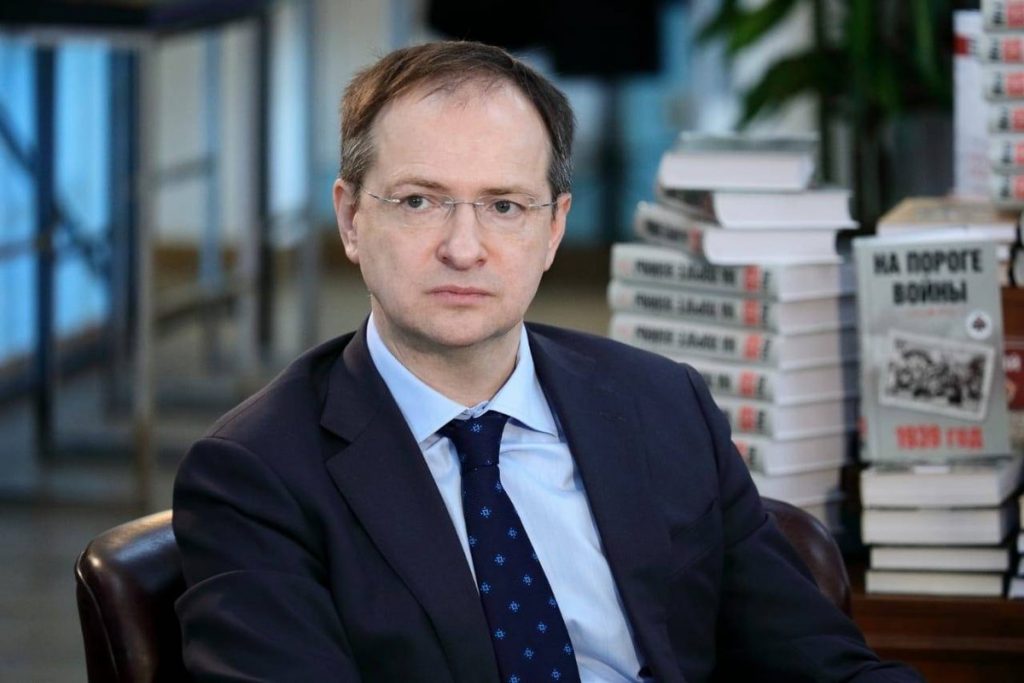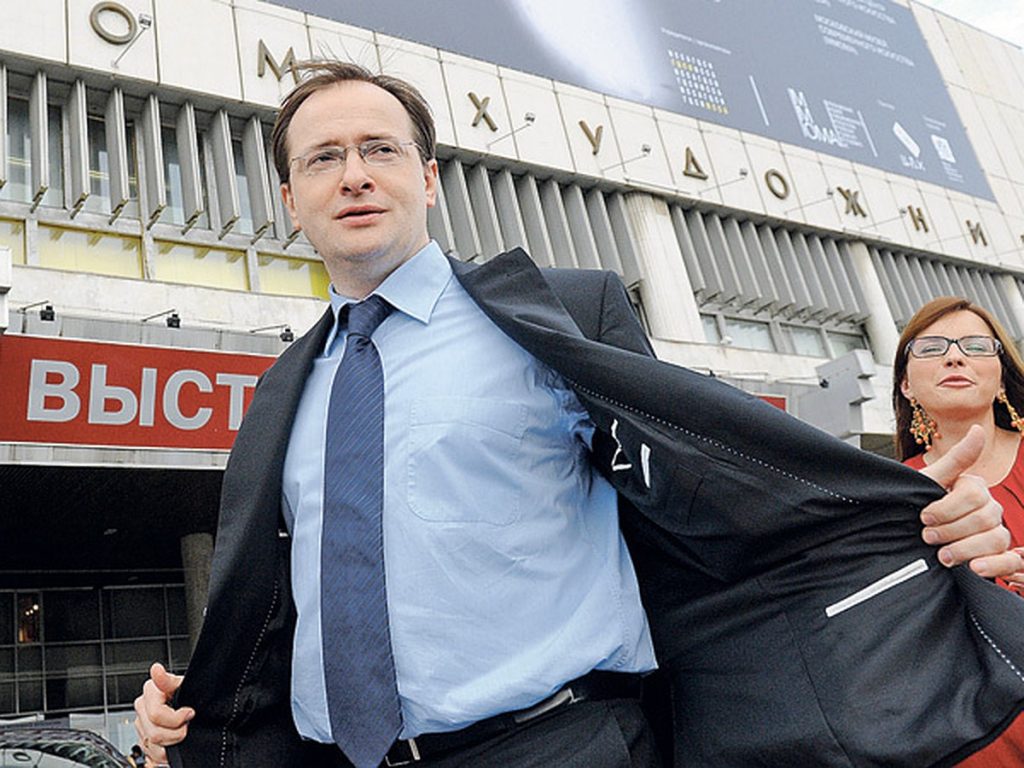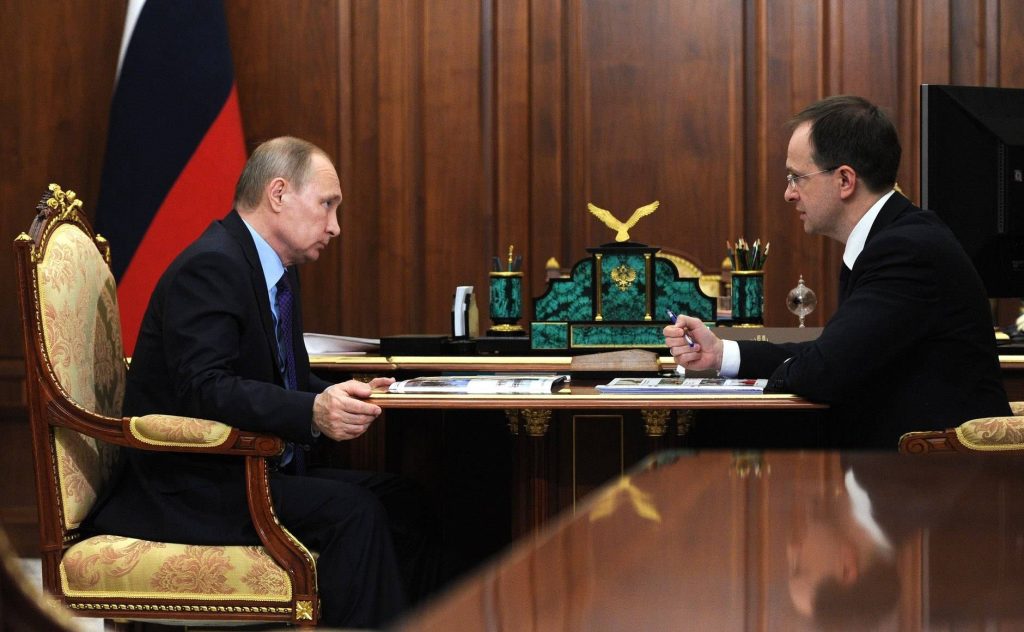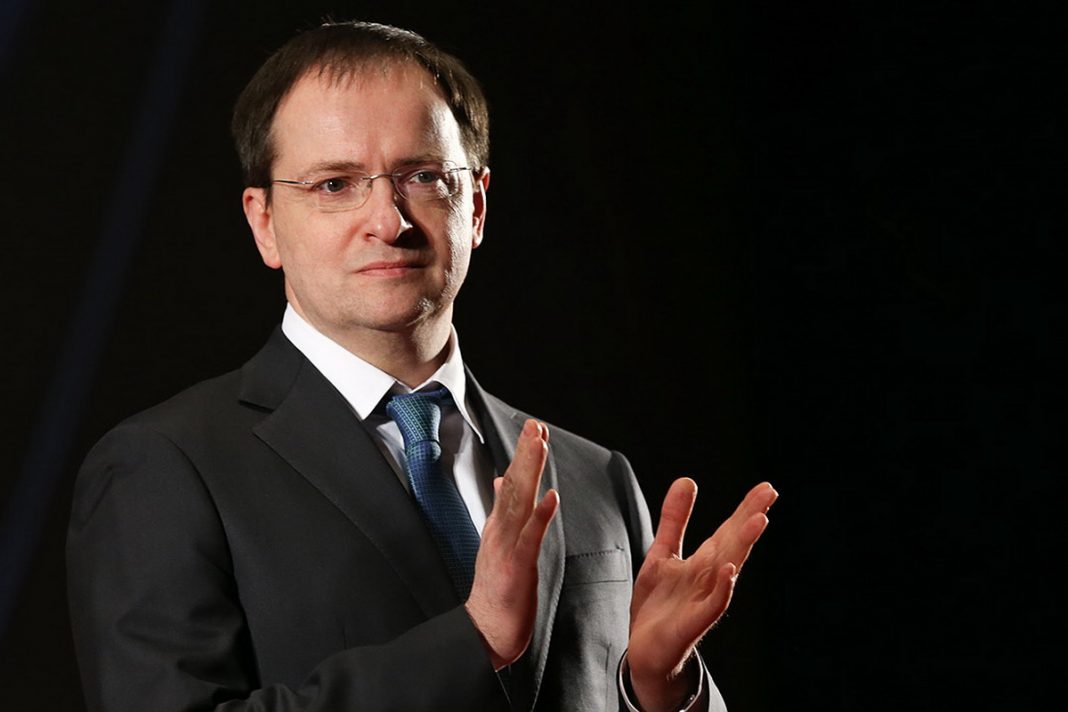In March 2022, when Russian troops were making attempts to encircle Kiev, and ideologists of the so-called “NWO” still believed in the possibility of achieving the desired goals in a matter of days, the first attempts of negotiation process between Ukrainian and Russian delegations took place on the territory of Gomel and Brest regions of Belarus. At the head of the latter was appointed Vladimir Medinsky, whom the media at the time called one of the main creators of the new “Russian national idea” with all its implications both in domestic politics and in the geopolitical arena.
In a matter of days, Medinsky became one of the Kremlin’s key spokesmen on Ukraine. He actively commented on the negotiations in the media and made many high-profile statements. His statements were often accompanied by contradictions: on the one hand, he spoke about the importance of dialog, while on the other hand, he repeated propaganda theses about a “special operation.” This reduced the credibility of his role as a neutral mediator. Actually, the negotiations themselves were not very successful: after several meetings in Belarus, the Istanbul format was agreed upon, which, as it became known later, was also unsuccessful.
However, almost three years after the beginning of the three-day “special operation,” the theme of resuming the negotiation process sounds louder and louder. And remarkably, the Kremlin still sees Medinsky as a possible negotiator on the Russian side.
Ascolta continues its series of biographical profiles to form an in-depth and exclusive political portrait of Putin’s Russia, in which the main actor is qualitatively complemented by every member of his inner circle.
This Content Is Only For Subscribers

Vladimir Rostislavovich Medinsky was born on July 18, 1970 in the town of Smela, Cherkassy region, where his father, Rostislav Ignatievich Medinsky (born December 12, 1937), a Ukrainian by nationality (his parents come from the village of Olchedava, Murovano-Kurilovetsky district, Vinnitsa region), served at that time. In 1968, Captain Rostislav Medinsky took part in the invasion of Czechoslovakia by Soviet troops. At the time of his son’s birth, Rostislav Medinsky commanded a company in the 866th Guards Artillery Regiment, stationed in the town of Smela. In 1974, Major Rostislav Medinsky was transferred to Moscow, where he worked in the Central Administration of Rocket Fuel and Fuels of the Ministry of Defense of the USSR. His official biography lists service in hot spots (Afghanistan, etc.), but rather these were business trips: the family did not leave Moscow, in 1975 in Moscow was born the youngest daughter – Tatiana (married Zuikova, married to a well-known lawyer Sergei Zuikov, managing partner of the company “Zuikov and Partners”).
After graduating from high school, Vladimir Medinsky entered the Faculty of International Journalism at MGIMO, where he was the only Lenin scholarship holder since 1990. It is noteworthy that at that time the rector of MGIMO was the diplomat and intelligence officer Andrei Stepanov (who for some time headed the Soviet residency in Austria). It is also significant that the deputy dean of the Faculty of International Relations, and since 1991 the dean, was Yuri Bulatov, who served as a military interpreter, and in the early 80s was an advisor to the Soviet embassy in Afghanistan (at a time when Medinsky’s father was seconded to the embassy. At the same time, Andrei Yermak’s father and Dmitry Kuleba’s father worked at the USSR trade mission in Afghanistan). Later, Yuri Bulatov became the main mentor of Medinsky Jr. (Medinsky’s worldview and his love of history were instilled by Bulatov).
Another patron of Medinsky is Professor Yuri Torkunov (who headed the Faculty of International Relations before Bulatov, now rector of MGIMO). In 2023, Medinsky and Torkunov co-authored a textbook on Russian history. The last chapter of the textbook is devoted to the NWO and contains such sections as: “The Revival of Nazism,” ‘Ukrainian Neo-Nazism,’ ‘The Return of Crimea,’ ‘The Fate of Donbass,’ ‘Special Military Operation,’ ‘Ukraine – an Ultra-Nationalist State,’ ‘New Regions,’ and ”Russia – a Country of Heroes.”
In 1991-1992 Medinsky interned at the Russian Embassy in the United States (as press secretary), working under the Ambassador, Viktor Komplektov. But in March 1992, Medinsky succumbed to a conflict with the new ambassador, Vladimir Lukin, which prevented him from continuing his diplomatic career. Medinsky reportedly still has a strained relationship with Lukin.
After graduating from MGIMO, he entered graduate school, and at the same time, together with two classmates, Yegor Moskvin and Sergei Mikhailov, opened an advertising and PR agency “Corporation ‘Ya’. Medinsky himself told in a private conversation that in 1996 he met the writer Viktor Pelevin. The plot of the novel “Generation R” was based on the story of Medinsky and his company. Since 1999, Medinsky has been considered Victor Pelevin’s main consultant and sponsor, contributing to the annual publication of his books and creating excitement around them.
One of Ya Corporation’s major clients was Wimm-Bill-Dann, founded in 1992 by Sergei Plastinin, David Yakobashvili and Mikhail Dubinin. Iakobashvili and Plastinin are still close friends of Medinsky.

In 1998, he became an advisor to General Sergei Almazov, Director of the Federal Tax Police Service of Russia, and moved to the civil service. Very soon Medinsky became the head of a department in the Ministry of Taxes and Levies of the Russian Federation (the minister is Georgy Boos, Medinsky’s friend and former client of his firm). Boos is Yuri Luzhkov’s cousin (Luzhkov baptized his daughter Elena).
Thanks to Boos and Luzhkov, in 1999 Medinsky joined the capital’s headquarters of the Fatherland-All Russia movement, became the movement’s chief political technologist, and after Fatherland-All Russia was renamed the United Russia party, he became the party’s campaign manager in Moscow for the 2003 State Duma elections. In the same year he became a deputy of the State Duma.
In the “noughties” years, he proposed to Dmitry Medvedev, the head of the Presidential Administration, a scheme to bring Russian political scientists and political technologists under total control: to hand out contracts in exchange for loyalty. If a certain political consultant shows opposition sentiments, a “black list” is sent down to the regions and no serious politician will work with him. Medinsky himself supervised these lists for some time.
Medinsky is in alliance with Sergei Kirienko, and consequently with the Kovalchuk clan.
Ascolta sources personally acquainted with Medinsky state: “Putin has a very poor memory for dates, but he loves history. Medinsky knows how to present historical facts in such a way that it does not overload the brain with unnecessary information. From some time Medinsky began to be called to Putin – to tell him the history of Russia, to talk about outstanding people. Gradually, Putin became “hooked on Medinsky”. And the latter began to lobby for certain issues – to allocate money for a museum or a plaque, to hold a festival somewhere, to award a medal to someone. Of course, not for nothing, for a small penny.
Medinsky, as Minister of Culture, took an inventory of all the storerooms of Russian museums and was very seriously engaged in replenishing the collections of Russian businessmen and politicians. He is friends with disgraced billionaire Konstantin Malofeev and solves many of his issues. Many use the fact that Medinsky has access to Putin – to solve their own issues.
Medinsky was lobbied to become Russia’s culture minister in 2012 by Igor Sechin – also a big history buff.
Medinsky has a strained relationship with SVR chief Sergei Naryshkin: this began after Medinsky created the Russian Military Historical Society, which Naryshkin saw as a counterweight to his Russian Historical Society. Recently, information has been increasingly circulating that Medinsky wants to take Naryshkin’s place and head the SVR.
Medinsky’s lectures on Russian history and significant historical events are regularly watched by more than 15 million people. He is one of the most popular bloggers in Russia. His books are becoming bestsellers.
Medinsky has recently befriended Nikita Mikhalkov, Karen Shakhnazarov, Ivan Okhlobystin, Konstantin Khabensky, Konstantin Ernst, Zakhar Prilepin, Polina Gagarina and Nikolai Tsiskaridze, and has also taken on the patronage of retired officers and generals of the Russian intelligence services (officially, he is writing a book on the activities of the Soviet and Russian residency in the West). A close friend and actual co-author of Medinsky’s books is historian Leonid Mlechin. Medinsky is also friends with the President of Belarus Alexander Lukashenko and took Lukashenko’s son Nikolai under his guardianship.
Colonel Ivan Basik, head of the research institute of military history of the General Staff Academy, is considered to be Medinsky’s man. Also close to Medinsky are: Professor Abdulla Daudov (director of the Institute of History of St. Petersburg State University), Professor Mikhail Lipkin (director of the Institute of Military History of the Russian Academy of Sciences), Oleg Pankov (director of the Central Archive of the Ministry of Defense), Academician Yuri Torkunov (rector of MGIMO), Academician Alexander Chubaryan (scientific head of the Institute of Military History of the Russian Academy of Sciences).
Not so long ago, the Presidential Administration created a new department for state policy in the humanitarian sphere (cultural policy, traditional values, and historical education). Medinsky is the curator of this department and the initiator of its creation. Vladimir Bocharnikov (not related to Medinsky, but subordinate to him) has been appointed head of the department.
At the same time, Medinsky has a serious feud with Vladislav Surkov.
A partner and close friend of Medinsky (as well as Igor Sechin) is David Yakobashvili, a Georgian Jew, billionaire, well-known raider and art smuggler (former owner of Wimm-Bill-Dann, agricultural commodities marketer, friend of Dmitry Patrushev and former associate of shadow oligarch Dmitry Yakubovsky).
Medinsky is also a close friend of billionaire Potanin’s family (they invested together in the famous gymnasium in Pavlovskaya Sloboda, which is positioned as “Russia’s Hogwarts”).
Medinsky’s participation in the March 2022 negotiations with Ukraine was praised by Putin as “professional.” Apparently, he will continue to be entrusted with such actions.

In September 2024, Medinsky said that the country lacks enough labor force and 11 years of schooling is an “impermissible luxury.” The period of education should be shortened so that young people start working earlier, rather than “sitting around wondering what to do next.” This statement caused a very strong reaction, but was soon forgotten.
Medinsky is predicted to have a great future, as he has an even relationship with all the players in Putin’s entourage and is also the Russian president’s “favorite.”
Medinsky is married to Marina (born in 1981), the daughter of scout and later businessman Oleg Nikitin. Vladimir and Marina have four children. In 2019, Medinsky’s father-in-law was arrested in the United States and charged with operations violating US sanctions. According to the version of the US Ministry of Justice, Nikitin, the head of the St. Petersburg company KS Engineering, and his employee Anton Cheremukhin wanted to buy in the United States for $ 17.3 million Vectra-40G gas turbine, which falls under sanctions, for which purpose they conspired with the head of the Italian-registered company GVA International Oil and Gas Services Gabriele Villone, an employee of this organization Bruno Caparini and the head of the American company World Mining and Oil Supply Dali Bagru. He was sentenced to five years in prison but was released to Russia after two years.
Medinsky lives in Pavlovskaya Sloboda on the Novorizhskoye highway, next to Anton Vaino’s houses.


